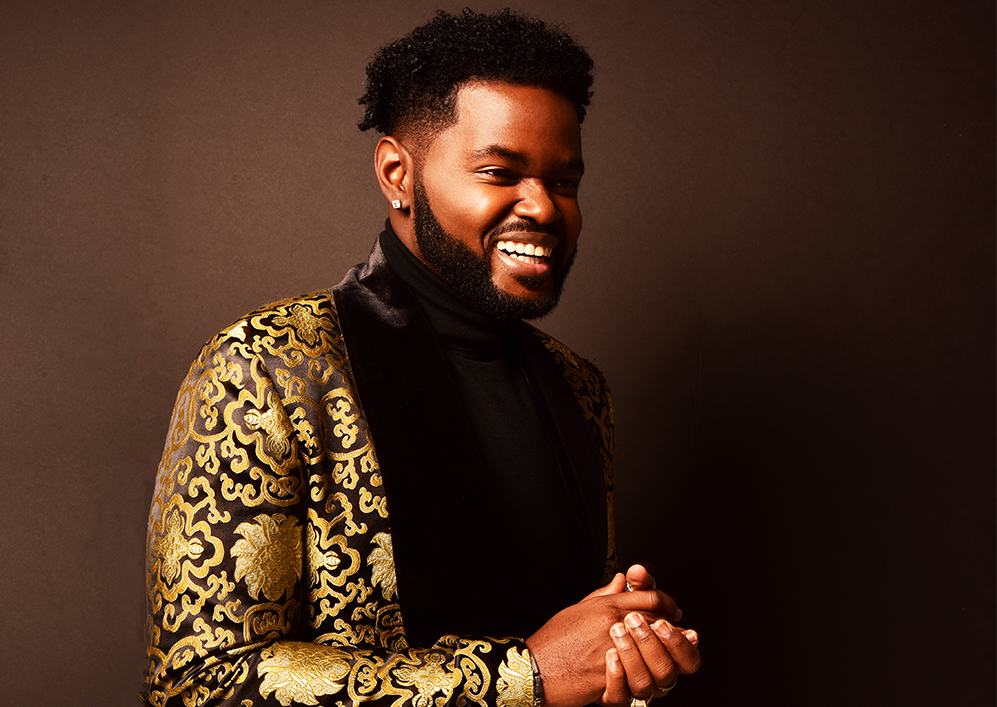
An interview with countertenor and vocal all-rounder John Holiday
‘I can sing really, really high’
Perched on a comfortable couch in his classroom – which looks more like a cosy living room – at the campus of the University of Maryland, countertenor and singing teacher John Holiday met up with us at the end of a teaching day to share how he got into singing, how he managed to wiggle his way into American living rooms, and how, in his opinion, an ornamentation of a Handel da capo aria is not much different from an ad lib in pop and jazz music.
Text: Jasmijn van Wijnen
It sounds like a cliché, but in John Holiday’s case it is true: ‘My mother and grandmother tell me that I was singing even before I could talk.’ To his mind, he never made an intentional choice to become a professional singer. He just knew he had to sing. ‘I love what I do. I do the things I think are meant for me in this life. I’ve always felt I was a singer, so I very much enjoy the privilege of being one and trying to be the best I can be.’
In reply to the question of whether he comes from a musical family, Holiday is adamant: ‘There’s not one person in my family who can’t hold a tune.’ But he is the first opera singer in his family. Holiday’s first experience with classical music was when he joined The Fort Bend Boys Choir of Texas as a child. This is where he learned about classical music and classical singing technique. Now he is the one introducing his family to classical music, and opera in particular: ‘My family doesn’t listen to opera, but they do come and listen to me when I perform in operas. I’m basically their gateway to opera.’
‘I can sing really, really high,’ he said to his singing teacher early on and he went on to show her. She knew right away that he was a countertenor. His teacher suggested to Holiday that he should apply himself exclusively to refining the specific countertenor vocal technique, rather than switching back and forth between different voice types. ‘So that’s what we did.’
Although the countertenor voice type tends to lean towards baroque repertoire, Holiday moves freely between a wide variety of music worlds. A quick Google search shows that he is just as at home on the opera stage as he is – microphone in hand – in front of four judges in spinning chairs. It was in 2020 that Holiday decided to become a contestant on popular talent show The Voice in the US.

The Voice
‘Opera can be such a niche genre, a closed box that opens up to a select audience only. My goal has always been to become a household name, to make sure that everyone knows that I’m that guy who sings opera, as well as jazz and pop music. I knew very early on in my career that I wanted to bridge the gaps between different communities. And then I was asked to audition for The Voice. It was 2020 and the world had come to a standstill because of COVID. All my plans had been cancelled. So I decided to go for it. It was my way of staying connected to my audience and to show myself to the world. And to tell everyone: yes, I may be a classically trained singer, but this is a huge part of me too. I grew up with jazz and pop music, so it’s ingrained in my DNA. If you want John Holiday, you’ll have to accept every part of me. One couldn’t exist without the other.’
‘My ornamentations might be different from one night to the next’
‘Being a contestant on The Voice brought me exactly what I had in mind: it took me into the living rooms of people who’d otherwise never have seen or heard of me. Through my music, I gave them a glimpse of my heart and soul. I still get recognised on the street and people come to my classical concerts because they know me from The Voice. That was my goal exactly. Given the chance, I’d definitely do it again.’ He found the only criticism from the classical music realm easy to refute: his recent debut at the prestigious Metropolitan Opera in New York had nothing to do with him being on The Voice. ‘I’d been engaged to perform in New York long before I decided to become a contestant on the show,’ Holiday says.

From da capo tot ad lib
A series of ornamentations at the end of a Handel aria or a long ad lib in a pop song: Holiday does not really see the difference. ‘Some music historians will say that my ornamentations aren’t right. To them, I’d say, they can’t be wrong, because I feel them. And I know when they’re not right, because I feel that too. No one can tell me that Farinelli, the star castrato, knew exactly what he was going to do with his ornamentations when he walked onto the stage. I firmly believe that he did what he thought was right in the moment and poured all his passion and energy into his performance. That’s how I do it too. Don’t forget that the performers who first sang the roles of Agrippina and Nerone were the stars of their generation. I highly doubt that someone told them how to sing. They sang how they wanted to and it wasn’t written down until after. It might be unusual, but don’t be surprised if my ornamentations are different from one night to the next.’
Nerone
While Holiday enjoys singing light music and showing people who he really is, he also loves playing characters that are further removed from his true self. Nerone is such a character: ‘He’s used to getting what he wants. He’s spoiled and privileged, and he’s extremely close with his mother. He wants to make her proud, but at the same time create his own identity. That’s what I enjoy most about playing a role: I get to delve into all the different aspects of people who couldn’t be more different than me. We know who Nerone was historically. He’s Nero, the Roman emperor, but in Agrippina, we mostly see him as a son who’s trying to meet his mother’s expectations.’
Holiday has played in Barrie Kosky’s Agrippina before, when it was performed in Munich. He surprised himself at the time. In Kosky’s stage direction, the opera is very demanding physically. He had to sing while rolling on the floor and jumping over benches: ‘I didn’t know I could do that,’ Holiday says. When relearning his role, Holiday was reminded of the fact that Nerone is not only restless, but also rather temperamental at times. ‘It falls on me to evoke some level of empathy for Nerone and make him resonate with the audience. My job is to take the audience with me on Nerone’s journey.’
Kosky’s layered stage direction is very helpful in this: ‘Barrie Kosky is a genius. Agrippina is an opera seria, a serious opera, but Barrie has managed to incorporate a number of comical elements in his staging too. The plot is revealed from the beginning: we come to know early on that Agrippina will do anything to oust Claudio as emperor and put Nerone – that’s me – on the throne. But the relationships between all the different characters are so hard-edged that the performance captures the audience until the last note. The relationship between Agrippina and Nerone is particularly unusual: I don’t want to say too much about that at this point.’ In Holiday’s opinion, this relationship is a condensed reflection of the main theme of Handel’s work: ‘crazy big love and the fear of losing what belongs to you.’
John Holiday will play the role of Nerone in Dutch National Opera’s Agrippina from 13 through 28 January 2024.